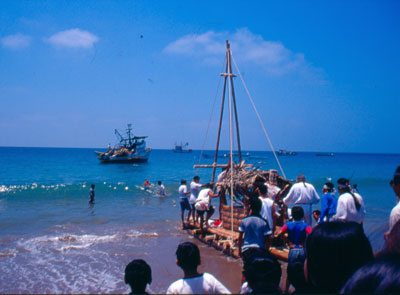Ecuador Field School
Ecuador, South America
June 22, 2024 - August 4, 2024
Ethnographic Fieldwork in Coastal Ecuador
This course provides the student with the opportunity to put anthropological methods and theories into practice through participation in a supervised fieldwork situation in a village in coastal Ecuador. Doing ethnographic fieldwork is the hallmark of cultural anthropology. More than any other approach to the study of culture, it is the primary defining criterion for the discipline and its practitioners. For most anthropologists, having done fieldwork is both a fundamental rite of passage that moves one towards professional status and an important life event that in some fashion shapes the individual. This course attempts to recognize the importance of fieldwork to the student personally as well as to introduce the student to a series of methods that anthropologists use in the process of doing fieldwork and gathering data.

Program Structure
In general, students spend the first two weeks mapping and doing observation, while more slowly embarking on verbally intensive methods. By the third week, participants narrow their interests to a primary research topic that is focused on for the rest of the program. The final days are spent writing an ethnographic report. In the past students have focused on some of the following topics and produced some fine studies: women's roles, agriculture, fishing, young men's groups, education, health and disease, childbirth, evangelism, and card playing as a site of masculinity. There is still plenty of work to accomplish on each of these and a wide array of topics that haven't been explored. Student participants come from diverse backgrounds and with diverse interests. Some, but not all, are anthropology majors. Some speak Spanish very well, while others struggle mightily with both speaking and comprehending. The most important qualities required for this program are a willingness to place oneself in situations that demand concentration and alertness and a willingness to write daily, intensive field notes.


Program Cost/Deadline
The program cost is $3,500.00. The deadline to submit an application is March 1, 2020. Early application is encouraged as enrollment is limited to a maximum of 10 students. Application forms are available through the application below. Further information can be obtained by email mharris@fau.edu or post to Ecuador Field School, FAU/Department of Anthropology, 777 Glades Rd., Room SO171, Boca Raton, Fl. 33431.
Academic Requirements
Undergraduate or graduate standing from an accredited university or college and 2.5 or better GPA. Anthropology and non-anthropology majors are encouraged to apply. Necessary is a strong motivation to participate in another cultural system and to record perceptions daily.
Tuition
FAU students must register for FAU course ANT 4802 (3-6 credits), with permission from the Department of Anthropology. Students from other colleges and universities are welcome to participate on the program as a non-degree student and have to register for 1 audit credit if they do not need the full course credit transferred back to their home institution. FAU tuition rates still apply.

The Region
The coastal region of southern Manabi province is characterized by stretches of small mountains and hills that run along the coast. Depending on altitude and distance to the ocean, the flora varies from dense tropical forest to dry scrub and cactus. Coastal villages and towns are most often located in river valleys that drain mountain runoff into the Pacific. Thus, most villages and towns are located seaside, adjacent to the beach. Local economies are dependent on ocean products, with horticulture (manioc, corn, beans) practiced on nearby inland terraces, and tree crop cultivation (citrus, tagua, coffee) in low mountain areas.
The program takes place in Salango, a fishing village of approximately 1,200 inhabitants. The closest town to the village is Puerto Lopez, a ten minute ride by camioneta (a small truck used to transport goods and people). Puerto Lopez has an open air market, numerous small shops, pharmacies, some doctors, a small hospital, and some restaurants.
Living Conditions in the Field
Students live in a research center located in the village of Salango. The village has a few small stores, a couple of restaurants, a church, and bars. The research center is a walled compound located on the beach. Students are housed in the Center's quarters. The rooms have electric outlets and light, although electricity is sometimes intermittent. The center has computer facilities, an excellent, small archaeological museum, modern kitchen, showers (no hot water) and toilets. Breakfast and dinner are prepared at the center by project cooks. Students make their own sandwiches for lunch.